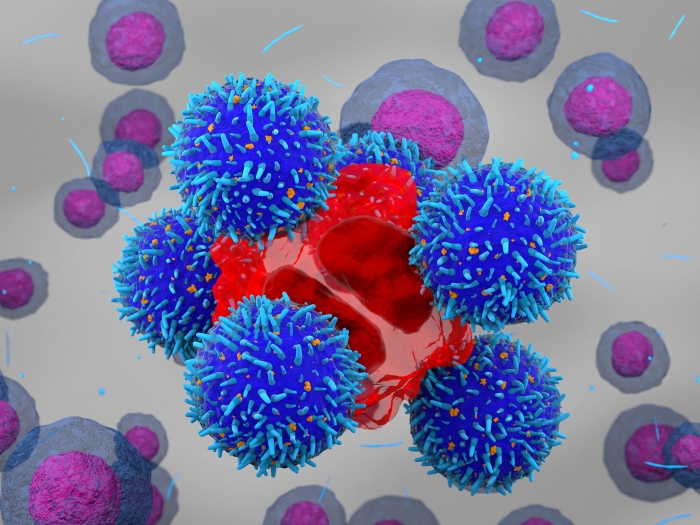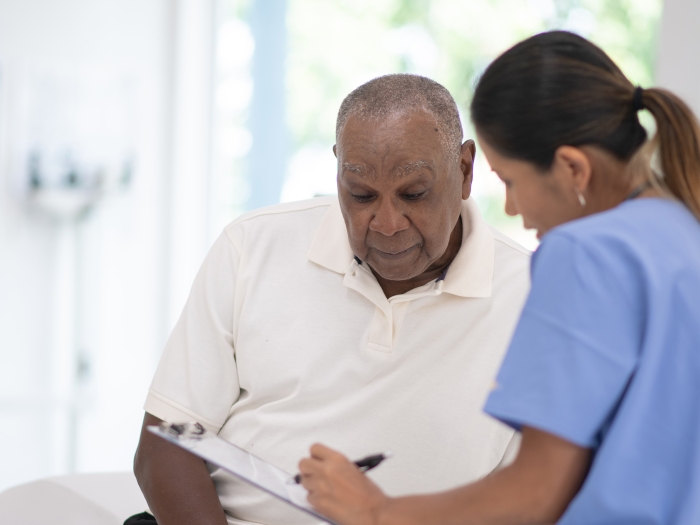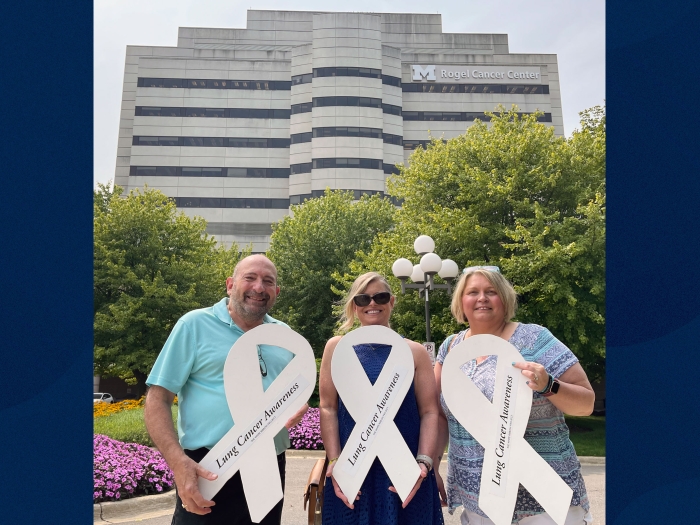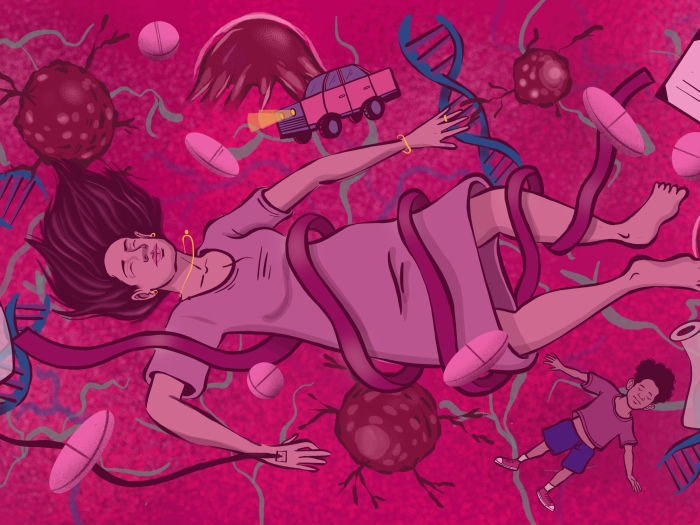A urologic oncology fellow dedicates his career to debunking false notions about racial biology.
3:21 PM
Author |

Randy Vince Jr., M.D., still remembers which seat he was sitting in (back left row, closest to the door) when one of his medical school professors brought up the racial disparity in deaths from prostate cancer.
Vince can recall exactly what clothing he was wearing (dark blue jeans and a grey sweatshirt – it was always cold in that room) when he asked the instructor whether access to adequate treatment plays a role in the higher mortality rate for African-American men compared to white.
He has replayed the urologic oncologist's dismissive response over and over: "No, it's tumor biology."
"As a current fellow in urologic oncology, this statement continues to echo in my mind," Vince wrote in a JAMA article titled "Eradicating Racial Injustice in Medicine—If Not Now, When?" in July. "Innumerable studies have convincingly demonstrated that biology alone does not explain the differences in prevalence and outcomes seen among African Americans—in fact, far from it."
Disproving this idea has become his life's work. Concurrently with his urologic oncology fellowship, Vince is pursuing a master's degree in computational medicine and bioinformatics that will allow him to create more informed datasets documenting the effect of environmental stressors on cancer diagnoses, treatment and outcomes. And he's openly sharing his experience and perspective on the need for diversity in medicine, taking the conversation to prominent journals and soon to the virtual Diversity in Medicine conference, where he'll serve as one of the keynote speakers.
In advance of his talk, Vince sat down with the Michigan Health Lab to talk about the history of racism in medicine, the need for clinicians to do community outreach in minority communities and the ability for all of us to reeducate ourselves.
How did your experiences as a child and early adult affect your career choices?
Vince: I always tell all of my friends that, in my heart, I'm still a kid from West Baltimore.
As I transitioned from childhood – during which I witnessed societal problems like poverty, food insecurity, drugs and violence – into medicine and saw a different side of things, it gave me the ability to see both sides of the tracks. And then, on top of that, my grandmother passed away from kidney cancer when I was in medical school. I found out later on that she did not receive the care she should have.
So both of those experiences helped shape my viewpoint and helped me start to look more analytically at the problems that occur in society and how they overlap with health care, rather than just looking at the numbers.
Why is urology a good vehicle for this kind of work?
Vince: Traditionally, within urology, there's been this notion that being a Black man makes you more predisposed to having bad prostate cancer. You're just born that way.
If you step back and think about how we define race in this country, rules like the one drop [in which someone who has any Black ancestry is considered Black] or one-eighth, in which all you have to have is one great-grandparent who is predominantly of African descent and you are now considered Black, didn't make sense to me. Why would one of my cousins, who has a white dad and a Black mom, have the same inherent risk for prostate cancer as I do having two Black parents? His mom doesn't have a prostate. His dad does. His dad is white. But because of the way we classify race in this country, he's now considered Black, so you're telling me that I have the same risk as he does, and it's all because we're Black?
MORE FROM THE LAB: Subscribe to our weekly newsletter
It just doesn't make sense. So that lends itself as the perfect vehicle to say, 'Guys, we're thinking about this all wrong.'
How did you decide what to focus on once you chose urologic oncology as a specialty?
Vince: Most of the cancers we treat within urology aren't cancers that are innately inherited. It's not one specific gene that was passed down to your parent or to you.
For instance, cigarette smoking increases your risk of various diseases, including some urological cancers. That's not something you're born with. That's an environmental exposure or a lifestyle choice.
If you are completely oblivious to the situations that cause the problem, there's no way you can make changes to fix the problem.
To me, it only makes sense that other stressors that go along with living in different communities – or lack of stressors that go along with living in different communities – would have a similar effect. So I wanted to look at the level of gene expression and use that to improve our ability to treat patients and to give them the most accurate information as it relates to their disease.
How does the master's degree you're pursuing in computational medicine and bioinformatics complement those ideas?
Vince: I needed to learn how to incorporate different datasets into the analysis I wanted to perform and then learn how to build better datasets moving forward. As a clinician, I believe you should not be hesitant to collaborate with experts from fields like bioinformatics or public health in your research because they look at things from a different lens. By combining multiple areas within health care research, we can provide more useful information. I don't want to be in 100 publications, but not impact anyone's life for the better.
SEE ALSO: Similar Factors Cause Health Disparities in Cancer, COVID-19
In JAMA, you wrote about your professor who was adamant about the idea that racial biology, not the environment, could explain disparities in cancer outcomes. Why do you think this misperception continues to pop up in medicine?
Vince: There are so many different factors. One is there's a dearth of diversity in medicine as a whole. If you're operating within an oppressed system or a system of oppression and you're one of the privileged, you don't tend to analyze why the system is oppressing people and how it's oppressing people. But we can't get ourselves on a more solid foundation, a more logical foundation, a more scientific foundation, until we acknowledge that structural racism has been an integral part of the field of medicine in this country.
What kind of positive changes have you seen in urology regarding diversity?
Vince: As a specialty in medicine, urology has so much work to do. At last count, 2% of practicing urologists were Black, and 3.9% were of Hispanic origin, which is not representative of the society we live in.
At Michigan Medicine, I do feel like we're making strides within our department. We have an anti-racism initiative with a book club and right now, we're reading a book called Caste by Isabel Wilkerson. It outlines how so many of the caste systems throughout history are built on the same pillars, whether it's racism in America, Nazi Germany or the caste system in India. These initiatives around educating ourselves and being more anti-racist and acknowledging historical events and learning from them and unlearning certain things we have been taught – that's really inspiring because I feel like that's where it starts. If you are completely oblivious to the situations that cause the problem, there's no way you can make changes to fix the problem.
But it's not enough to say we notice this disparity within this certain group of people. It's not enough to say we need to analyze that disparity. You need to get out into the community and actually find ways to engage the community.
Like Podcasts? Add the Michigan Medicine News Break on iTunes, Google Podcast or anywhere you listen to podcasts.
How do you ensure that final piece, the community outreach portion, happens?
Vince: For most impoverished communities, there's a distrust when it comes to the medical community as a whole. Because, throughout history, Black people were experimented on without their consent.
I've heard people say about a prestigious hospital in Baltimore, 'You don't want to go there because you won't come back.' So acknowledging that history and then going out into the community and saying, 'Hey, I'm here. I want to build this relationship with you. I want to be able to help' and then going repeatedly, so it's not just one time and they never see you again.
By building that trust, when I do have results from research, I can go back and say, 'You know me. You know I have your best interests at heart. Now this is how these results can help better your life and improve your health.'
Has your background, growing up in an impoverished community, helped you understand how to better build these types of relationships?
Vince: Does having that lived experience allow me to see the value in it? Absolutely. Does that mean that someone who does not have that lived experience can't? No, I don't think so, but I think there needs to be a willingness to receive the information when it's presented to you.
The best way to do that is to think about times when you felt marginalized and stressed and how that impacted you emotionally. Then, when someone else comes to you and says, 'When I experience these things on a daily basis, it makes me feel extremely stressed and it is impacting me emotionally, mentally and ultimately physically,' you don't have to say, 'Well, I haven't lived that, so I don't believe what you're telling me.' No, just accept it and work with them to actually make positive change.
I feel like if people started to do that more, we would be in a much different place in this country.
You've talked about your personal experiences, but your recent journal articles include plenty of data and step-based approaches to incremental change. Why do you think it's important to include the latter as well?
SEE ALSO: Racial Disparities in the Time of COVID-19
Vince: Joseph Goebbels was the Reich minister of Nazi propaganda and he had a quote where he said, 'If I tell a lie big enough and constantly repeat it, people will start to believe it.'
If that's what a lot of oppressive systems throughout history are built on (and we do know that's the case, we've seen it with the whole election conspiracy), you need to be able to combat that with data.
And then start making incremental changes, right? What strategies have you suggested in your articles and talks so far?
Vince: In the JAMA piece, I laid out the different stages of adult learning and then compared them to where we currently find ourselves at this time in history. Given the social unrest of the past year or so, I think a lot of people are now starting to recognize there is truly a problem where before they didn't. Now it goes from recognizing the problem to actually thinking about ways we can address the problem. And then the ultimate goal is to eliminate the problem, and then there'll be no more structural racism.
If we could erase the impact of structural racism tomorrow, I would love that, but I realize this is built off hundreds of years of history and practices, and it's going to take a while to completely reverse. But every opportunity I get, I'm there trying to enact change.

Explore a variety of health care news & stories by visiting the Health Lab home page for more articles.

Department of Communication at Michigan Medicine
Want top health & research news weekly? Sign up for Health Lab’s newsletters today!





